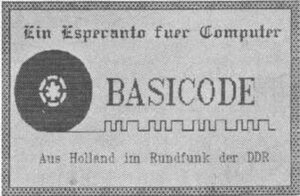This article needs additional citations for verification. (April 2022) |

BASICODE was a computer project intended to create a unified standard for the BASIC programming language. BASIC was available on many popular home computers, but there were countless variants that were mostly incompatible with each other. The project was initiated in 1980 by Hobbyscoop, a radio program of the Dutch broadcasting organisation Nederlandse Omroep Stichting (NOS).
The language implementations were architecture-specific utility applications that executed calls of subroutines for text and audio defined in the BASICODE language standard, adapted according to the abilities of the host computer system. These applications, called Bascoders, also enabled the sharing of data and programs across different computer platforms by defining a data format for the cassette tapes that were regularly used as storage media in the 1980s.[1] A BASICODE program stored on cassette could be loaded and run on any computer supporting the language. BASICODE was often called "Esperanto for computers" for that reason.[2]